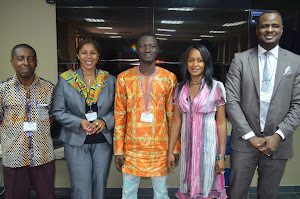BY EDMUND SMITH-ASANTE
Five transformational initiatives aimed at accelerating and scaling-up action against a range of health, crop and climate-damaging pollutants were given the go-ahead by ministers meeting in the Swedish capital Stockholm, on Tuesday April 24, 2012.
It is believed the initiatives, which mark the beginning of the implementation phase of the new Climate and Clean Air Coalition, will fast track momentum towards reducing black carbon or ‘soot’, methane and a range of fluorinated gases called HFCs.
The meeting assessed around a dozen initiatives proposed by developed and developing countries for fast and federated action on short lived climate pollutants including many happening already at the national level.
Delegates took forward five steps to be approved for rapid implementation by ministers on the final day, due to the following reasons.
Studies show that reductions are possible by addressing emissions from the freight transportation supply chain, through city action plans, and adoption of a range of measures for reducing sulphur in fuels and vehicle emissions.
Mexico has for example [20,000] small and medium-sized brick kilns and the design of many of the [6,000] in Bangladesh hark back to the 1900s.
World-wide the waste management sector contributes about 11% of global methane emissions, and the coalition will work with cities to reduce methane emissions from landfills by improving strategic municipal solid waste planning and providing technical assistance.
Natural gas venting and leakage from the oil and gas industry accounts for over one fifth of global man-made emissions of methane: Flaring at oil installations generate both methane and black carbon emissions. An estimated one third of leaks and venting can be cut using existing technologies at low cost.
HFCs are being rapidly introduced as replacements to chemicals that can damage the ozone layer - the Earth’s protective shield that filters out hazardous ultra violet light. But HFCs are also powerful greenhouse gases.
The Coalition aims to fast track more environmentally-friendly and cost effective alternatives and technologies to avoid HFC growth.
Furthermore, additional initiatives – including a proposal by Ghana on agricultural/forest open burning and a proposal by Bangladesh on cookstoves – would be further developed over the coming weeks.
Revealing these in a press release, the United Nations Environment Programme (UNEP), said fast action to reduce short lived climate pollutants can have a direct impact on climate change with the potential to reduce warming by up to 0.5 degrees Celsius by 2050 and help keep global temperature increases below 2 degrees Celsius.
It maintained that reductions of SLCPs would also allow for addressing rapid melting in the Arctic and in mountain regions with glaciers, like the Himalayas.
UNEP disclosed that by around 2030, fast action can potentially prevent millions of premature deaths from for example inhalation of black carbon while avoiding an estimated 30 million tonnes of crop losses.
 |
| Hillary Clinton announcing the Coalition |
Five transformational initiatives aimed at accelerating and scaling-up action against a range of health, crop and climate-damaging pollutants were given the go-ahead by ministers meeting in the Swedish capital Stockholm, on Tuesday April 24, 2012.
It is believed the initiatives, which mark the beginning of the implementation phase of the new Climate and Clean Air Coalition, will fast track momentum towards reducing black carbon or ‘soot’, methane and a range of fluorinated gases called HFCs.
The meeting assessed around a dozen initiatives proposed by developed and developing countries for fast and federated action on short lived climate pollutants including many happening already at the national level.
Delegates took forward five steps to be approved for rapid implementation by ministers on the final day, due to the following reasons.
§
Fast action on diesel emissions including from
heavy duty vehicles and engines
Studies show that reductions are possible by addressing emissions from the freight transportation supply chain, through city action plans, and adoption of a range of measures for reducing sulphur in fuels and vehicle emissions.
§
Upgrading old inefficient brick kilns which are
a significant source of black carbon emissions
Mexico has for example [20,000] small and medium-sized brick kilns and the design of many of the [6,000] in Bangladesh hark back to the 1900s.
§
Accelerating the reduction of methane emissions
from landfills
World-wide the waste management sector contributes about 11% of global methane emissions, and the coalition will work with cities to reduce methane emissions from landfills by improving strategic municipal solid waste planning and providing technical assistance.
§
Speeding up cuts in methane and other emissions
from the oil and gas industry
Natural gas venting and leakage from the oil and gas industry accounts for over one fifth of global man-made emissions of methane: Flaring at oil installations generate both methane and black carbon emissions. An estimated one third of leaks and venting can be cut using existing technologies at low cost.
§
Accelerating alternatives to HFCs
HFCs are being rapidly introduced as replacements to chemicals that can damage the ozone layer - the Earth’s protective shield that filters out hazardous ultra violet light. But HFCs are also powerful greenhouse gases.
The Coalition aims to fast track more environmentally-friendly and cost effective alternatives and technologies to avoid HFC growth.
Furthermore, additional initiatives – including a proposal by Ghana on agricultural/forest open burning and a proposal by Bangladesh on cookstoves – would be further developed over the coming weeks.
Revealing these in a press release, the United Nations Environment Programme (UNEP), said fast action to reduce short lived climate pollutants can have a direct impact on climate change with the potential to reduce warming by up to 0.5 degrees Celsius by 2050 and help keep global temperature increases below 2 degrees Celsius.
It maintained that reductions of SLCPs would also allow for addressing rapid melting in the Arctic and in mountain regions with glaciers, like the Himalayas.
UNEP disclosed that by around 2030, fast action can potentially prevent millions of premature deaths from for example inhalation of black carbon while avoiding an estimated 30 million tonnes of crop losses.








